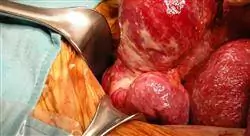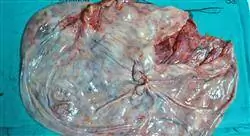University certificate
The world's largest faculty of medicine”
Introduction to the Program
New circumstances in gynecologic oncology have pushed us to develop new educational programs that meet the real needs of experienced professionals, so that they can incorporate new advances into their daily practice"
The fact that the ovarian cancer mortality rate is so high makes the disease a problem for women and a public health risk.
As most of these ovarian tumors are detected in advanced stages of the disease, the survival rate is only about 30% of cases. Those from the ovaries and fallopian tubes have a peculiarity: they are the tumors with the greatest influence and variability in prognosis with respect to the way they are treated. This makes a thorough understanding of the disease and the correct application of treatments the basis for increasing the survival and cure rates of patients with the disease.
This program is oriented to achieve the updating of the procedures of action for the patient with ovarian cancer. In addition, thanks to this program the student will be able to conceptually manage both the bases of tumor biology and specific medical treatments, as well as the rest of the aspects related to the diagnosis and treatment of ovarian cancer in women.
This Postgraduate Diploma will allow you to learn about the latest advances in Ovarian Cancer, using the latest educational technology"
This Postgraduate diploma in Ovarian Cancer contains the most complete and up-to-date scientific program on the market. Its most notable features are:
- The examination of clinical cases, recorded with POV (Point of View) systems from different angles, presented by experts in gynecology and other disciplines
- The graphic, schematic, and practical contents with which they are created, provide scientific and practical information on the disciplines that are essential for professional practice
- Presentation of practical workshops on procedures and techniques.
- An algorithm-based interactive learning system for decision-making in the clinical situations presented throughout the course.
- Action protocols and clinical practice guidelines, which cover the most important latest developments in this specialist area.
- All of this will be complemented by theoretical lessons, questions to the expert, debate forums on controversial topics, and individual reflection assignments.
- Special emphasis on test-based medicine and research methodologies in oncology
- Content that is accessible from any fixed or portable device with an Internet connection
This Postgraduate diploma may be the best investment you can make when selecting a refresher program, for two reasons: in addition to updating your knowledge on Ovarian Cancer you will obtain a Postgraduate diploma issued by TECH Global University"
The teaching staff includes a team of renowned gynecologists and oncologists, who bring their professional experience to this program, in addition to recognized specialists belonging to leading scientific societies.
The multimedia content developed with the latest educational technology will provide the professional with situated and contextual learning, i.e. a simulated environment that will provide an immersive training program to train in real situations.
This program is designed around Problem-Based Learning, whereby the specialist must try to solve the different professional practice situations that arise throughout the Postgraduate diploma. For this reason, you will be assisted by an innovative, interactive video system created by renowned and experienced experts in the field of gynecology and oncology with extensive teaching experience.
Incorporate the latest developments in the approach to Ovarian Cancer into your daily practice and improve the prognosis of your patients"
Seize this opportunity and take the next step to get up to date on the latest developments in ovarian cancer treatments"
Why study at TECH?
TECH is the world’s largest online university. With an impressive catalog of more than 14,000 university programs available in 11 languages, it is positioned as a leader in employability, with a 99% job placement rate. In addition, it relies on an enormous faculty of more than 6,000 professors of the highest international renown.

Study at the world's largest online university and guarantee your professional success. The future starts at TECH”
The world’s best online university according to FORBES
The prestigious Forbes magazine, specialized in business and finance, has highlighted TECH as “the world's best online university” This is what they have recently stated in an article in their digital edition in which they echo the success story of this institution, “thanks to the academic offer it provides, the selection of its teaching staff, and an innovative learning method aimed at educating the professionals of the future”
A revolutionary study method, a cutting-edge faculty and a practical focus: the key to TECH's success.
The most complete study plans on the university scene
TECH offers the most complete study plans on the university scene, with syllabuses that cover fundamental concepts and, at the same time, the main scientific advances in their specific scientific areas. In addition, these programs are continuously being updated to guarantee students the academic vanguard and the most in-demand professional skills. In this way, the university's qualifications provide its graduates with a significant advantage to propel their careers to success.
TECH offers the most comprehensive and intensive study plans on the current university scene.
A world-class teaching staff
TECH's teaching staff is made up of more than 6,000 professors with the highest international recognition. Professors, researchers and top executives of multinational companies, including Isaiah Covington, performance coach of the Boston Celtics; Magda Romanska, principal investigator at Harvard MetaLAB; Ignacio Wistumba, chairman of the department of translational molecular pathology at MD Anderson Cancer Center; and D.W. Pine, creative director of TIME magazine, among others.
Internationally renowned experts, specialized in different branches of Health, Technology, Communication and Business, form part of the TECH faculty.
A unique learning method
TECH is the first university to use Relearning in all its programs. It is the best online learning methodology, accredited with international teaching quality certifications, provided by prestigious educational agencies. In addition, this disruptive educational model is complemented with the “Case Method”, thereby setting up a unique online teaching strategy. Innovative teaching resources are also implemented, including detailed videos, infographics and interactive summaries.
TECH combines Relearning and the Case Method in all its university programs to guarantee excellent theoretical and practical learning, studying whenever and wherever you want.
The world's largest online university
TECH is the world’s largest online university. We are the largest educational institution, with the best and widest online educational catalog, one hundred percent online and covering the vast majority of areas of knowledge. We offer a large selection of our own degrees and accredited online undergraduate and postgraduate degrees. In total, more than 14,000 university degrees, in eleven different languages, make us the largest educational largest in the world.
TECH has the world's most extensive catalog of academic and official programs, available in more than 11 languages.
Google Premier Partner
The American technology giant has awarded TECH the Google Google Premier Partner badge. This award, which is only available to 3% of the world's companies, highlights the efficient, flexible and tailored experience that this university provides to students. The recognition as a Google Premier Partner not only accredits the maximum rigor, performance and investment in TECH's digital infrastructures, but also places this university as one of the world's leading technology companies.
Google has positioned TECH in the top 3% of the world's most important technology companies by awarding it its Google Premier Partner badge.
The official online university of the NBA
TECH is the official online university of the NBA. Thanks to our agreement with the biggest league in basketball, we offer our students exclusive university programs, as well as a wide variety of educational resources focused on the business of the league and other areas of the sports industry. Each program is made up of a uniquely designed syllabus and features exceptional guest hosts: professionals with a distinguished sports background who will offer their expertise on the most relevant topics.
TECH has been selected by the NBA, the world's top basketball league, as its official online university.
The top-rated university by its students
Students have positioned TECH as the world's top-rated university on the main review websites, with a highest rating of 4.9 out of 5, obtained from more than 1,000 reviews. These results consolidate TECH as the benchmark university institution at an international level, reflecting the excellence and positive impact of its educational model.” reflecting the excellence and positive impact of its educational model.”
TECH is the world’s top-rated university by its students.
Leaders in employability
TECH has managed to become the leading university in employability. 99% of its students obtain jobs in the academic field they have studied, within one year of completing any of the university's programs. A similar number achieve immediate career enhancement. All this thanks to a study methodology that bases its effectiveness on the acquisition of practical skills, which are absolutely necessary for professional development.
99% of TECH graduates find a job within a year of completing their studies.
Postgraduate Diploma in Ovarian Cancer
Our complete Postgraduate Diploma in Ovarian Cancer will allow you to update your knowledge in one of the most important branches of medicine today. Around the world, thousands of women suffer from this pathology, which represents approximately 5% of cancer deaths worldwide. Given these figures, health centers and research laboratories are looking for the best professionals in the field, who can generate sustainable progress in this field of knowledge, providing new specialized knowledge. In this postgraduate course at TECH Global University we will provide you with the conceptual background necessary for you to stand out efficiently in your daily practice.
Postgraduate in ovarian oncology
From TECH we will train you with the most complete and updated thematic axes, which will allow you to renew specialized knowledge in the procedures and techniques performed in the different oncological procedures, incorporating these latest advances in the discipline to increase the quality of your daily medical practice and providing better expectations for the affected patient. In addition, we use high quality multimedia to improve your skills through simulated case studies, so you will be prepared to respond quickly and effectively to highly complex situations.









